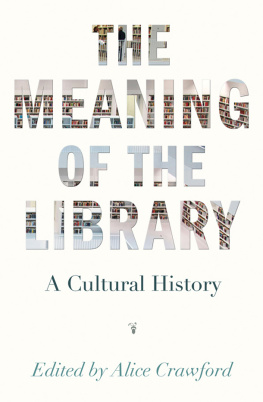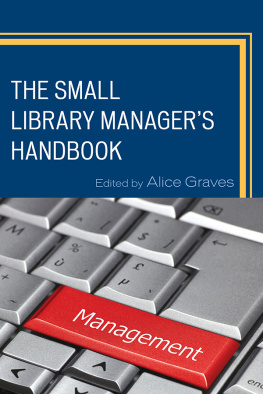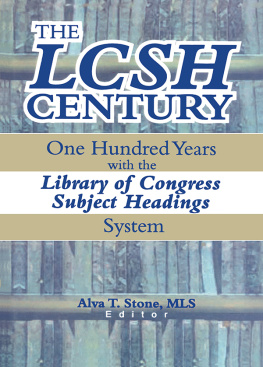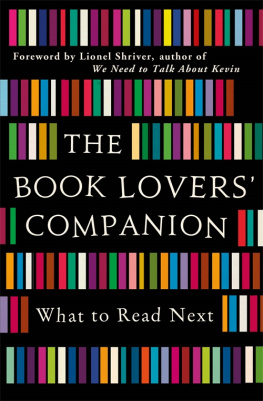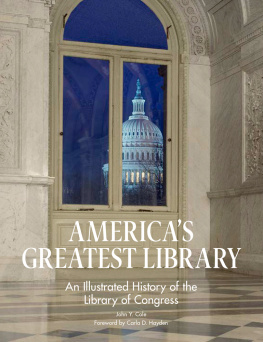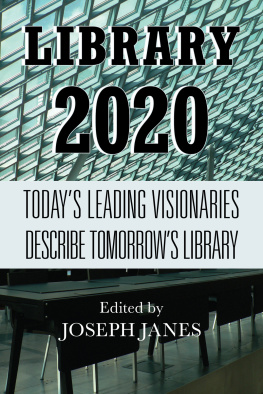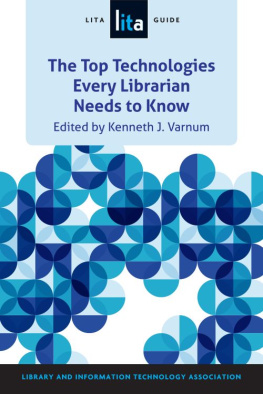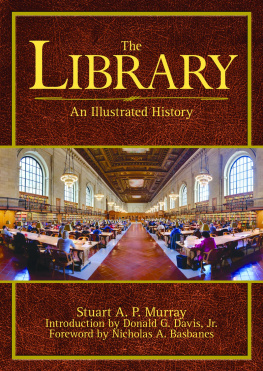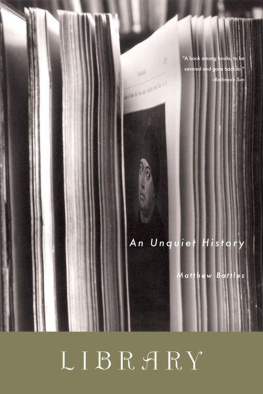
THE MEANING OF THE LIBRARY

King James Library, University of St. Andrews. Photograph by Peter Adamson.
THE MEANING OF THE LIBRARY
A Cultural History

Edited by Alice Crawford
PRINCETON UNIVERSITY PRESS
Princeton and Oxford
Copyright 2015 by Princeton University Press
Published by Princeton University Press, 41 William Street, Princeton, New Jersey 08540
In the United Kingdom: Princeton University Press, 6 Oxford Street, Woodstock, Oxfordshire OX20 1TW
press.princeton.edu
Epigraph from The Library at Night by Alberto Manguel is Alberto
Manguel, c/o Guillermo Schavelzon & Asociados, Agencia Literaria,
www.schavelzon.com.
Excerpt from Memorial: A Version of Homers Iliad by Alice Oswald.
Copyright 2011 by Alice Oswald. Used by permission of W.W. Norton & Company, Inc. and of Faber and Faber.
Lines from Casting and Gathering in Seeing Things by Seamus Heaney.
Copyright 1991 by Seamus Heaney. Used by permission of W.W. Norton & Company, Inc. and of Faber and Faber.
Lines from Andrew Georges translation of The Epic of Gilgamesh (Penguin, 1999) are quoted with the permission of Penguin Random House.
All Rights Reserved
ISBN 9780-691166391
Library of Congress Control Number: 2014951291
British Library Cataloging-in-Publication Data is available
This book has been composed in Garamond Premier Pro, Trade
Gothic, and Adobe Caslon Pro
Printed on acid-free paper.
Printed in the United States of America
1 3 5 7 9 10 8 6 4 2
For Robert, Lewis, and Blyth
CONTENTS

Alice Crawford |
Edith Hall |
Richard Gameson |
Andrew Pettegree |
Robert Darnton |
David Allan |
John Sutherland |
Marina Warner |
Robert Crawford |
Laura Marcus |
Stephen Enniss |
John P. Wilkin |
James H. Billington |
LIST OF ILLUSTRATIONS

FOLLOWING PAGE 158
ACKNOWLEDGMENTS

I am most grateful to all the people and institutions who have contributed to the production of this volume. In particular I must thank the academics and librarians who made the pilgrimage to St. Andrews to deliver the King James Library Lectures, which were the original inspiration for these essays, and the audiences who so enthusiastically received the talks and confirmed our feeling that lots of people still love libraries and want to know more about them. It is good to see these discussions of the meaning of the library now opened up to an even wider public.
Jon Purcell was director of Library Services at St. Andrews in 2009, when the book and lecture series were first suggested, and most generously provided library funds to launch the project. Deputy director Jeremy Upton and John MacColl, who succeeded Jon as director in 2010, continued to make that funding available over several years until the project was complete. They have my sincere thanksthis book would never have happened without them.
The contributors and I gratefully acknowledge Faber and Faber and W. W. Norton & Co. for permission to quote from Casting and Gathering by Seamus Heaney, and from Memorial by Alice Oswald. We are most grateful, too, to Penguin Random House for permission to quote from Andrew Georges translation of The Epic of Gilgamesh (Penguin, 1999) and to the Agencia Literaria Schavelzon, Barcelona, for permission to quote from Alberto Manguels The Library at Night (Yale University Press, 2008).
We would also like to thank the following for permission to reproduce illustrations: Peter Adamson (frontispiece); the Muse archologique de Sousse ().
Ben Tate, Ellen Foos, and Hannah Paul at Princeton University Press have guided and helped with tact and consideration at all stagesI am most grateful to them and to my wonderfully patient copyeditor, Kathleen Kageff, who has saved me from many pitfalls. My indexer, Blythe Woolston, has done a superb job, for which she has my warmest thanks.
Those at homeRobert, Lewis, and Blythknow most about the trials and tribulations that have accompanied the books long gestation. Their support and encouragement throughout have been invaluable.
A.C.
U NIVERSITY OF S T. A NDREWS L IBRARY
March 2015
INTRODUCTION

Alice Crawford
with bewildering optimism, we continue to assemble whatever scraps of information we can gather in scrolls and books and computer chips, on shelf after library shelf, whether material, virtual or otherwise, pathetically intent on lending the world a semblance of sense and order, while knowing perfectly well that, however much wed like to believe the contrary, our pursuits are sadly doomed to failure.
Alberto Manguel, The Library at Night
Any consideration of the meaning of the library must acknowledge Alberto Manguels compellingly candid assertion that as a construct it is doomed to failure.
All the essays in this collection tell the story of how, from earliest times, human beings have with bewildering optimism amassed collections of books and created buildings to put them in; how they have striven to assemble, encompass, and contain the materials on which the worlds knowledge is recorded in the vain but determined hope that they will somehow, ultimately, be able to gather it all into one coherent, ordered space.
Each essay enacts in its own way the paradox of that dynamic, the confrontation between the drive to build the all-embracing berlibrary and the acceptance that the endeavor will fail. They are essays full of oppositions. Just as the history of libraries charts the perpetual ups and downs of their growth and disintegrationlibraries throughout the ages have constantly been built up with gusto, destroyed by malice or neglect, then rebuilt by a hopeful new generationso the essays here reflect the continual ebb and flow of that impulse. Tensions complicate and enliven them all. They show how libraries can be both hugely purposeful and dangerously useless; how they can channel both order and chaos and house both print and digital, old and new; how they can both control and liberate the knowledge they contain. Each author in this collection enjoys the tangle of paradox and teases out the snarl of oppositions in an effort to articulate his or her sense of the many meanings with which the library as a concept seems to resonate.
The essays were collected between 2009 and 2013, against a backdrop of economic stringency that has seen many public libraries throughout the United Kingdom close. Figures from the Chartered Institute of Public Finance and Accountancy confirm the closure in 201011 of 146 branches, with the number increasing to 201 in 2012.
These essays were written, too, at a time when technological change has created the popular perception that there is no longer any need for libraries or librarians since, with a good search engine and the ever-increasing proficiency of the keyboard-tapping digital native, everyones a librarian now. With the loss of their traditional role as intermediaries between information source and user, librarians seek new purposes for their skills, and new arenas of usefulness. The questions Why libraries? and What are they for? are beginning to be asked with increasing urgency.
Next page
